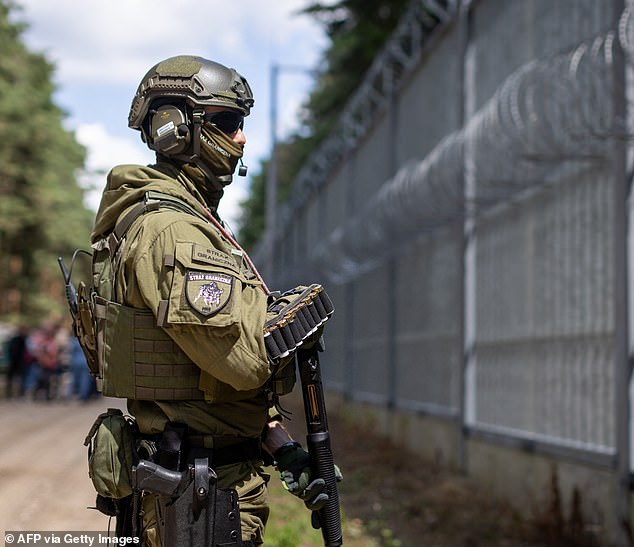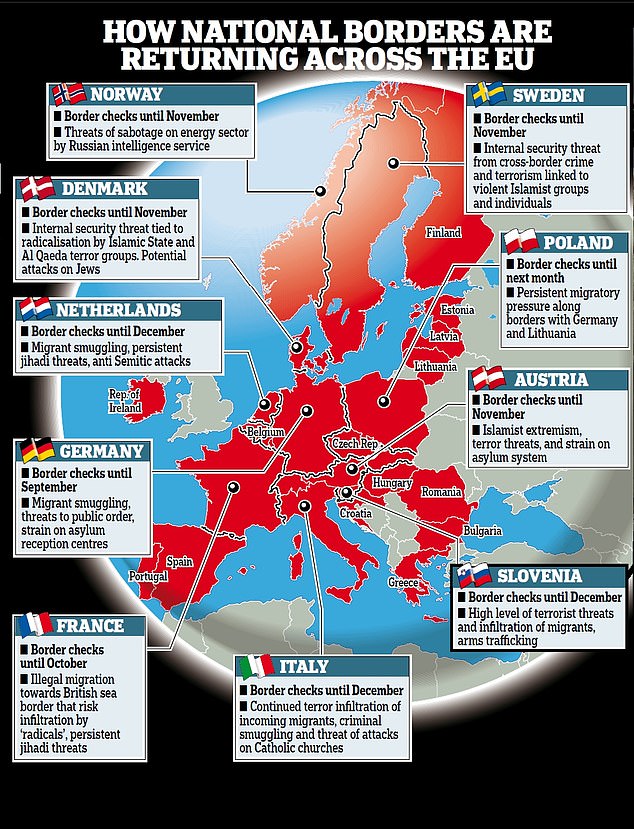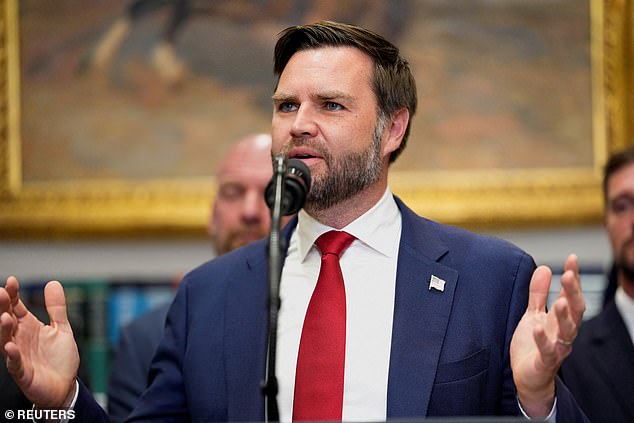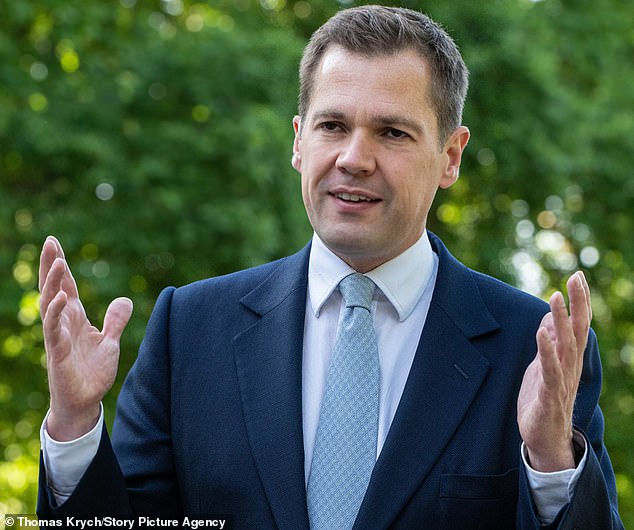It was as long ago as 1957 that freedom of movement was first enshrined as a fundamental right of EU citizens.
In the intervening 68 years, that right has only become even more ingrained, with the Schengen Agreement allowing the citizens of 25 EU member states to not just live and work in other countries but to come and go without any border checks.
But now that freedom is under threat as never before. In the face of ‘jihadi threats’ created by mass immigration, many EU member nations are scrambling to protect their people by reintroducing border controls, according to emergency security warnings sent to Brussels by more than a third of the bloc’s nations.
Ten countries, including the bloc’s two most influential members, Germany and France, have introduced emergency police identity checks with face-to-face interviews at hundreds of internal borders this summer, shattering the EU’s cornerstone policy of passport-free travel across the continent.
And the French government is in no doubt which country is at the root of the problem: Great Britain. In a slapdown to the UK, France has told the EU it blames ‘radicalised individuals’ heading towards Calais and Dunkirk for migrant sailings to England for its new clampdown on its borders with six neighbouring countries.
Government lawyers in Paris have explained border checks are imperative because both public order and internal security are at risk from ‘persistent jihadi threats’ by migrants flowing into and through, France.
The French alert chimes with US President Donald Trump’s rebuke late last month to the EU and Britain. Visiting Scotland, he said ‘bad people’ are entering Western nations because mass migration is uncontrolled.
In another intervention in March, America’s vice president JD Vance said ‘Christian’ Europe is at risk of engaging in ‘civilisational suicide’ because of a ‘migrant border invasion’, which has been coupled with free-speech curbs by Brussels on citizens who oppose it.

Poland has 65 border point controls with Lithuania and Germany and claims both are sending back or re-routing unwanted irregular migrants. Pictured: A Polish officer at the border

Joining the US critics is former Tory immigration minister Robert Jenrick.
He has just revealed a Home Office mandarin rebuked him last year for writing a Telegraph article warning individuals ‘linked to the Islamic State’ had already ‘waltzed right into’ Britain on traffickers’ small boats.
Mr Jenrick claims he was later confronted by the department’s ‘most senior civil servant’ who said that the assertion was ‘sensitive information.’
Our map shows EU border checks stretch from Italy, a key entry point by sea and land for illegal migrants, to the north of Europe. Rome has told Brussels ‘continued threats of terrorist infiltration’ among migrants escaping ‘Middle East turmoil’ is the reason for new checks at its Slovenian entry point.
Sweden says it faces ‘persistent threats’ from Islamist groups and individuals. Its borders are to be controlled until November due to ‘serious threats from… organised border crime and terrorism, highlighted by attacks involving military grade explosives against institutions and the public’.
Denmark, which has introduced border checks with Germany, warns the EU it fears ‘terror-related events tied to the Israeli-Hamas conflict and driven by terror groups such as Islamic State and Al Qaeda’ and ‘possible sabotage action from Russia’.
Austria blames new controls at Slovakia and Czech Republic entry points on ‘irregular migration’, the strain on asylum reception centres and security issues caused by ‘terrorist groups entering the country from the Middle East’. Poland has 65 border point controls with Lithuania and Germany and claims both are sending back or re-routing unwanted irregular migrants into the country. ‘The border guard, with support of police and Army, are undertaking these controls,’ Tomasz Siemoniak, the then interior minister said last month.
The security crisis sweeping Europe shows no sign of going away. Europol, the EU police force, released a report in June saying in 2024, a total of 58 terrorist attacks (34 completed, five failed and 19 foiled) were reported in 14 of the bloc’s member states.

America’s vice president JD Vance said ‘Christian’ Europe is at risk of engaging in ‘civilisational suicide’ because of a ‘migrant border invasion’

Robert Jenrick was rebuked last year for an article in the Telegraph warning individuals ‘linked to the Islamic State’ had already ‘waltzed right into’ Britain on traffickers’ small boats
More than a third of the total (24) were described as jihadist terrorism, an increase from 14 reported the previous year. Also, 21 of the attacks were by Left-wing and anarchist groups, and one by a Right-wing faction.
‘Jihadist terrorism remained the most lethal, resulting in five victims killed and 18 injured,’ said the report, noting that there had been 449 arrests for terror offences in the bloc.
‘Terrorism and violent extremism continue to pose a persistent and multi-faceted threat to the security of the European Union and its citizens,’ said Europol’s executive director Catherine De Bolle, in her report introduction.
It added of the 449 arrests, 133 were of people under 20, a worrying rising trend attributable to the internet and mental health conditions. The majority of the youths were suspected of jihadist terror offences, and 12 of involvement with Right-wing groups.
While both President Trump and Mr Vance have voiced migration concerns, an intervention has also come from multi-billionaire Tesla founder Elon Musk, the world’s richest man. He said in a video interview in April: ‘Terrorist attacks in Europe are rising weekly… If current trends continue the result will be widespread slaughter of innocent people.’
Two years ago, the Daily Mail revealed 19 suspected terrorists had arrived in Britain via small boats across the Channel. Security sources said they were foreigners linked to jihadi groups, including the Islamic State, who had come through Europe to cross from French beaches.
Incredibly, the 19 had been put up in hotels – paid for by the British taxpayer – by the then Tory government’s Home Office. They could not be deported due, in part, to human rights law.
Seven were already under ‘active investigation’ in other countries when they arrived, it was understood at the time. We have no idea where they are now; security services refuse to divulge.
It is clear the suspected terrorists cynically used the EU’s open borders, created by the Schengen Agreement, which pioneered the free movement of all people within the bloc.
Now borders are hurriedly snapping shut. This year, to the end of May, nearly 65,500 ‘irregular’ migrants slipped into Europe. Tens of thousands of others sought asylum, according to the EU. More than 25,000 foreigners, often undocumented young men, have crossed the Channel in traffickers’ small boats during 2025.
According to the EU’s ‘Schengen Code’, member nations are only allowed emergency border checks in response to ‘foreseeable’ threats from ‘terrorism, internal security, or large-scale mass unauthorised immigration’.
Now, as our map makes clear, that time has come.












